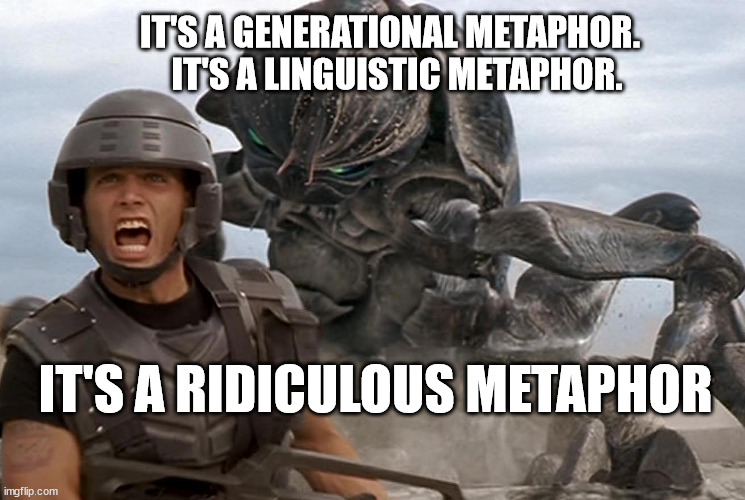
The interview that is the core of this piece took place in 2016 in the run up to Jisc’s Digifest that year, and I am sorry to say that the provocations I was asked to speak to are still apparently provocative, and still need to be said.
I wish for days when we might get to be provocative about new things. These are not those days.
Provocation one: The death of the digital native
The ‘digital native’ is a generational metaphor. It’s a linguistic metaphor.
It’s a ridiculous metaphor.
It’s the notion that there is a particular generation of people who are fundamentally unknowable and incomprehensible.
The original formulation even posited that there is something biologically different about the brains of these so-called digital natives, because of their early and frequent interaction with particular types of technology. It’s not true and anybody who connects with students and members of academic staff in any kind of practical way knows that people who engage with technology are not motivated by their age category.
Dangerous assumptions
There are very real dangers in adhering to this sort of generational narrative of disconnection – it’s an argument that says we’ll never understand them and, furthermore, that we cannot teach them.
There are policy implications: if your university philosophy is grounded in assumptions around digital natives, education and technology, you’re presupposing you don’t have to teach the students how to use tech for their education. And, furthermore, it will never be possible to teach that academic staff how to use that technology, either on their own behalf or for their students.
So you’ve set up at least two different barriers. You’ve set up a student barrier and you’ve also set up a barrier for members of academic staff who are then being fed a line about how they’re “dinosaurs” and will never get it. It cuts both ways and it’s disenfranchising across the board.
Instead of talking about these essentialised categories of native and immigrant, we should be talking about modes of behaviour because, in fact, some people do an awful lot of stuff with technology in some parts of their lives and then not so much in other parts.
Each person’s choices are embedded in a very particular context and each person is going to have different reasons for that behaviour. And that’s going to inform the nature of their practice. That’s going to inform the frequency they’re in that place. Indeed, it’s going to influence whether they think of the internet as a tool or a place.
Give people freedom
The workshops we have developed over the last several years are around helping people to visualise their practices so that if they do want to change, at least they know where they’re starting from. We have worked to move away from metaphors that encourage pigeonholing, and towards reflections on practice. It’s about what you do and why you do it, not about who you are as a person. It takes some of the value judgements out of descriptions of modes of behaviour.
What we end up with, in conversation, are descriptions of a range of possibilities and I like the idea of giving people the freedom to figure out where they fit in that range of possibilities instead of categorising them and making them feel limited based on some kind of bogus identity category.
Provocation two: Open by default?
How much of your university practice is behind closed doors? This is traditional, of course, gatekeeping our institutions of higher education, keeping the gates in the walled campuses closed.
The power and the privilege of open
What if those gates were open? What other sorts of things would we want to be open?
Imagine having at least part of your virtual learning environment (VLE) open, not just for current students (and even current students usually can’t see all the teaching that might be useful to them) but for non-students, prospective students, or staff members who want to know what’s happening down the road, across the country, in that academic department that interests them.
There would be so much potential for seeing the different ways in which departments are teaching, for instance. Which departments of biology are doing what in their labs? What theoretical approaches are they taking?
Of course careful thought has to be put into what you might open and why–and for whom? Whose content and who as people would be exposed to people who might mean them harm? What would your institution do to protect those people? How might people safely refuse to be open, because it is not safe?
Paywalls and passwords
So much of the pedagogy as well as the content of the university is locked away. That has implications not just for potential students but also from a policy perspective – if part of the problem in higher education policy is of non-university people not understanding the work of the university, being open would have really great potential to mitigate that lack of understanding.
What would happen from a political perspective – the funding of universities, the running of universities – if the people who want to hold universities accountable really knew what they do? And if we lock all our content away behind paywalls and password protection, we’re not giving the public an opportunity to see the work of a university either.
If we lock all our content away behind paywalls and password protection, we’re not giving the public an opportunity to see. And again, maybe there is a reason for that, maybe the politicians who want to see into the workings of the university are not acting in good faith, and want to target people who are teaching topics or in ways they object to. In all ways, institutions need to be transparent about their decisions, not just to keep some parts of their practice protected, but also to be open. Why? For whom?
Networked, open, transparent
The product of education should be effective citizenship that is enacted out in the open. I would like to see our universities modelling themselves more closely on what we should be looking for in society generally: networked, open, transparent, providing the opportunity for people to create things that they wouldn’t create all by themselves. What kinds of open practices could, done carefully, show people a way in?
Provocation three: Stop being ruled by ‘student expectations’
There are two huge problems with the notion of “student expectations”: firstly, the sense that, with fee/tuition based models, students’ ideas of what higher education should be now weigh much more heavily in the institutions’ educational planning. Secondly, institutions in part think their role is to make their students “employable” because some politician somewhere has said the university is there to get them jobs.
Setting low bars
Students coming into higher education don’t know much about what higher education can be. So if we allow student expectations to set the standard for what we should be doing, we create an amazingly low bar.
It’s the same as student and academic staff expectations of libraries: these tend to be quite traditional and fairly low level stuff. Do libraries provide content? Are they in a building? These users don’t know enough about the potential, so can their expectations stretch practice or reach for innovative things?
Student expectations limit
So, being ruled by student expectations is limiting because they don’t know what they don’t know, while we who work in higher education do have a certain level of expertise around what’s possible. That’s not to say we should ignore the needs of students or shouldn’t pay attention when they tell us what would be effective for them. But part of our job is to provide a space for our students to stretch and explore things and if all we do is meet their expectations they’re not going to do that.
The employability issue
The employability issue is more difficult because I don’t think we in higher and further education ever want to be saying we don’t care if our students don’t get work – that’s not true. But the framing of it is all wrong. The point of any educational system is not to provide people with jobs. That’s the role of the economy.
So, if the economy is failing and people can’t find work, it’s not the fault of the university; the university shouldn’t feel it has to fundamentally shift its reason for existing.
Universities are about becoming
To my mind, the reason we have higher education – and, indeed, any state-funded education system – is to provide space for us to produce engaged and effective graduates who will be prepared for whatever any given economy throws at them, by being able to think and connect and be critical. And those things are relevant to employability, in the sense that any smart employer will want employees with those attributes.
Businesses are not saying “I want someone who went through a programme that promised them a job”. I think there’s a real disconnect between what real employers actually want, the political rhetoric around the role of the university and the university’s reaction to political pressure.
I do think that businesses increasingly have been moving their responsibility for developing people’s skills further toward the education sector. Graduates are not, and should not be fully formed “workers” ready to be able to step into a role. Graduates are ready to learn more, ready to apply their creative, thinking, critical, minds to the roles they move into. They are not pails to be filled, as graduates, they have had their fires lit, and where they go next should add fuel and oxygen to those fires.
I’d like to see universities, and people who work within them, take a stand against being defined as job-training. I don’t think that serves anybody.
Provocation four: Educational technology – fit for purpose?
I want to get people to start from the notion that there are educational things that they want to do, or educational processes that they would like to engage with, and then – and only then – talk about the technology.
Educational practice first
This is the opposite of having technology drive practice, of saying to an educator,
“so we have Moodle, this is what you can do in Moodle. You want to have a conversation with your class? This is what it has to look like in Moodle”.
That’s technology shaping educational practice in a really top down way. I want the educational practice to come first. We have seen in the recent pandemic emergency many ways that assumptions around available and necessary technology has shaped what teachers (and students) think is possible in online education. How do we create opportunities and space for people to think carefully about what they want to be doing, before choosing the technology or technique by which to do it?
Institutions can approach educational technology in two very different ways. They can have a learning technology division that is basically in charge of acquiring and maintaining educational technology. Or they can provide spaces to develop pedagogy and then think about the role of technology within that pedagogy.
I think the ‘fit for purpose’ debate is evidence of the tension for those who would like to start with the education but are being told by their institutions that they have to work with particular kinds of tools. I think those debates are actually artefacts of going about it the wrong way: a history of institutions handing people tech instead of starting with their intentions for teaching and learning.
